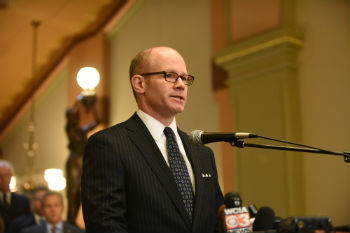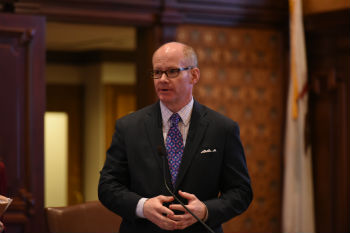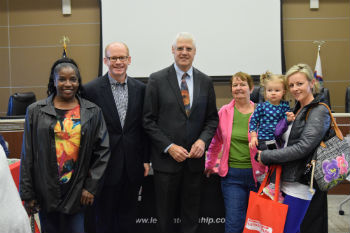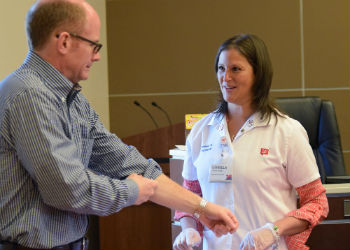- Details
- Category: News
 SPRINGFIELD – Senator Don Harmon (D-Oak Park) and a bipartisan group of Springfield lawmakers today called for renewed contract negotiations between Gov. Bruce Rauner and the union that represents 38,000 Illinois state workers.
SPRINGFIELD – Senator Don Harmon (D-Oak Park) and a bipartisan group of Springfield lawmakers today called for renewed contract negotiations between Gov. Bruce Rauner and the union that represents 38,000 Illinois state workers.
Harmon noted his support of a measure that would have allowed interest arbitration in the event of an impasse between Rauner, whose anti-union sentiments are well documented, and the American Federation of State, County and Municipal Employees.
“Twice I passed a bill that would provide for interest arbitration. Twice the governor vetoed that bill, and twice the General Assembly failed to override the veto,” Harmon said. “The governor’s rationale at the time was that he was willing to stay at the bargaining table and negotiate a deal. That sentiment appears to have vanished.”
AFSCME – the American Federation of State, County and Municipal Employees – is the largest union representing state government employees. No contract negotiations between the Rauner administration and the union have occurred since Jan. 8, 2016, when the administration claimed the parties were at impasse.
More than 30 state lawmakers of both parties and both houses of the Legislature gathered for a news conference Wednesday to show their support for continued good-faith negotiations between the administration and union representatives to avert a labor disruption and bring about an acceptable compromise.
“I think it is critically important to the people of Illinois that we try to reach an agreement that is fair to everyone and enables us to continue to provide vital services,” Harmon said, adding that Gov. Rauner is not practicing what he preaches when he refuses to participate in negotiations.
“The governor is demanding that the legislative leaders join him at a bargaining table every day to discuss his agenda and its impact on our state budget,” Harmon said. “I would hope that he would hold himself to that same standard in negotiating with the union and return to the bargaining table immediately.”
- Details
- Category: News
The following guest column by Senator Don Harmon was published in The (Springfield) State Journal-Register on Sunday, Nov. 27, 2016.
As wealthy politicians clamor to cut benefits for workers who are injured and killed on the job, it's a fitting time to remember a mine accident a century ago that was so tragic it moved lawmakers to make Illinois a national leader on workers' compensation and workplace safety.
In 1909, the Cherry Mine in Bureau County employed 550 men and produced 1,500 tons of coal daily to fuel locomotives. Immigrant families flocked to Cherry for steady employment in what was considered one of the safest mines in the nation.
 During a Saturday shift on Nov. 13 that year, a kerosene torch dripped oil on a cart filled with hay. It smoldered unnoticed until a blaze erupted, trapping many of the workers in the bowels of the mine. In the end, 259 people died, leaving behind 500 fatherless children and 160 widows.
During a Saturday shift on Nov. 13 that year, a kerosene torch dripped oil on a cart filled with hay. It smoldered unnoticed until a blaze erupted, trapping many of the workers in the bowels of the mine. In the end, 259 people died, leaving behind 500 fatherless children and 160 widows.
Donations poured in for the victims' grief-stricken families, and a settlement was reached with the railroad company. Each family received $1,800 for the loss of life and income.
Human error and problems with the mine's design contributed to the death toll. It remains one of the worst mining accidents in U.S. history.
Stunned lawmakers quickly acted to ensure better oversight of the industry, improve safety standards and establish a formal workers' compensation system, making Illinois a national leader. In 1911 it became the third state to establish a workers' compensation system; Maryland passed a law in 1902, and Wisconsin passed one earlier in 1911.
A state historical marker at the site today tells the tragic tale and notes Illinois' progressive response.
We should be proud of our record of supporting injured workers. Instead, wealthy politicians and corporate executives tell us the costs associated with workers' compensation are too high and thwart economic growth — even though we made significant changes to the system in 2011, saving employers hundreds of millions of dollars.
I am open to discussing further changes and learning more about the challenges companies face. We need them to invest in our state and its workforce.
But it infuriated me when I read a letter ("Illinois must reform workers' comp") in the Oct. 7 edition of The State Journal-Register by an Illinois Manufacturers' Association executive asking, "Is it fair that Illinois businesses pay $470,000 for an arm injury when the national average is only $170,000?"
Is it fair? I guess it depends on how much your arm is worth to you. What price do you place on playing catch with your kids or hugging your grandchildren? Are you willing to lose your house and life savings to pay the bills that stack up after your arm is mangled in a machine at work?
Workers need assurances, too. No-fault workers' compensation systems were established largely with the blessing of corporations that faced unlimited liability when sympathetic jurors were confronted with disfigured workers or grieving widows who had no choice but to sue in civil court. In exchange, states limited the liabilities companies face for workplace injuries and illnesses.
Now Gov. Bruce Rauner wants workers to give up more, even as federal officials have threatened intervention because states continue to scale back this important safety net at an alarming pace.
Further changes to workers' compensation in Illinois must strike a compassionate balance between the needs of injured workers and those of the companies we rely on for a vibrant economy. We should never forget how far we've come.
— State Sen. Don Harmon, D-Oak Park, is president pro tempore of the Illinois Senate.
- Details
- Category: News
 Senator Don Harmon (D-Oak Park) issued the following statement today following the state Senate’s vote to override Gov. Bruce Rauner’s veto of automatic voter registration in Illinois:
Senator Don Harmon (D-Oak Park) issued the following statement today following the state Senate’s vote to override Gov. Bruce Rauner’s veto of automatic voter registration in Illinois:
“Automatic voter registration is a commonsense, good-government measure that streamlines services and saves money while requiring state bureaucracy to work for the people, not the other way around. There is no reason to force citizens to interact with state government twice when once will do the job. We can offer one-stop shopping – you get your driver’s license and you’re registered to vote.
“Automatic voter registration is a logical next step in our ongoing efforts to expand the franchise in Illinois and encourage people to participate in elections. It would alleviate the need for same-day registration, put an end to duplicative government paperwork, save the taxpayers money and make life easier for the people of Illinois.”
Harmon is a longtime ambassador for efforts to expand voter access in Illinois, sponsoring measures to bring early voting, online voter registration, vote-by-mail and same-day voter registration to the state.
As a result of those efforts, this year nearly 60,000 Illinoisans took advantage of grace-period voter registration (Oct. 24 until Election Day), according to Election Day figures compiled by the Illinois State Board of Elections. In at least two Chicago-area counties, lines for same-day voter registration reportedly topped out at two hours, and in Carbondale in southern Illinois more than 700 people took advantage of same-day registration.
Online voter registration continues to be a popular option with voters, as well, with some 62,000 people throughout the state registering during one weekend in late October alone, according to a Board of Elections spokesman.
Harmon is a chief co-sponsor of Senate Bill 250, the automatic voter registration bill, which garnered broad bipartisan support in both houses of the Legislature in the spring but was vetoed during the summer by Republican Gov. Bruce Rauner.
- Details
- Category: News
 FRANKLIN PARK -- Dozens of area residents took advantage of a one-stop shop for health and wellness resources, government services and information about local programs during a health fair sponsored by Senator Don Harmon (D-Oak Park) and the Village of Franklin Park on Friday, Oct. 21.
FRANKLIN PARK -- Dozens of area residents took advantage of a one-stop shop for health and wellness resources, government services and information about local programs during a health fair sponsored by Senator Don Harmon (D-Oak Park) and the Village of Franklin Park on Friday, Oct. 21.
Scroll down for video from event.
Community health fairs like these are an important service provided by elected officials because they are a way to bring public and private resources to residents.
"I think it's important to bring government resources to the people I represent and not expect them always to come and find out from government what resources are available," Harmon said, noting that the state budget stalemate has affected the availability of services to people throughout Illinois.
 "As folks find doors that used to be open to them closed, they're looking to find the open windows, and that's what we're trying to do here -- to make sure that as many state and local, public and private resources as we can muster are pulled together in one place at one time so that folks can take full advantage of them."
"As folks find doors that used to be open to them closed, they're looking to find the open windows, and that's what we're trying to do here -- to make sure that as many state and local, public and private resources as we can muster are pulled together in one place at one time so that folks can take full advantage of them."
The Franklin Park health fair included flu shots, free health screenings, public safety information, local service providers and more.
Harmon is hosting a second health fair on Friday, Oct. 28, at the Addison Park District community room, 120 E. Oak St.. Rep. Kathleen Willis is co-sponsoring the event, which is scheduled for 9 a.m. until 1 p.m. and will feature a variety of services, including:
 Flu shots from Walgreens (insurance required, Medicare or cash payment accepted)
Flu shots from Walgreens (insurance required, Medicare or cash payment accepted)- Free health screenings and disease prevention information
- On-site motor-vehicle services from the Illinois secreatry of state, including driver's license and ID renewal
- Unclaimed property search with the help of the Illinois treasurer's I-Cash program
- The Illinois attorney general's anti-fraud unit
- Information from local oragnizations, including the Addison Fire Protection District, the Addison Park District, Elmhurst Hospital and more
- Giveaways and refreshments
The Addison health fair is free and open to people of all ages. For more information, contact Senator Harmon's office at 708-848-2002.




